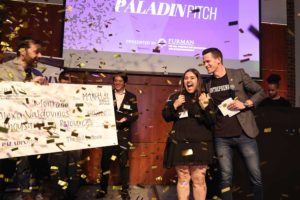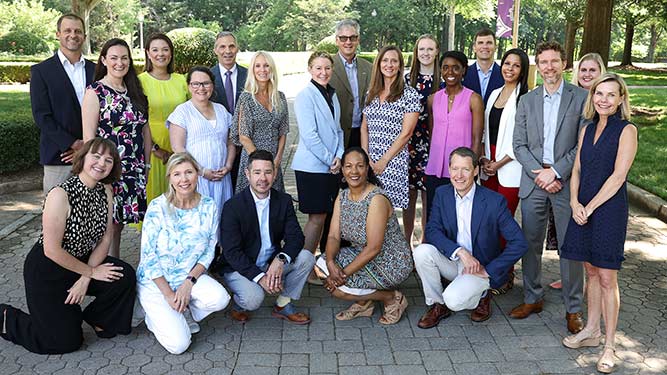THE CHANGE WE SEEK
Perhaps it was an internship at the local hospital. Or the hard work to weatherize a city resident’s home. Or maybe it was teaching students in the local elementary school.
These defining moments along a student’s pathway are found through the Cothran Center for Vocational Reflection, the Shucker Center for Leadership Development, the Malone Center for Career Engagement and the Furman Humanities Center. Furman’s four institutes, too, offer abundant ways for students to personalize their pathway toward a life of purpose by making a positive community impact on the community.
The four institutes form a collective of expertise and provide students with engaged learning opportunities and pathway-defining experiences.
The Institute for the Advancement of Community Health (IACH) facilitates high-impact experiences for students to explore health-related careers. The institute conducts research of evidence-based interventions with community partners, while maintaining a commitment to health equity, justice and diversity.
Furman students who participate in IACH programs, courses and experiences can map a unique, guided journey to a career in health. Their individualized pathways prepare them to enter and influence health professions with a comprehensive understanding of the challenges and focused solutions.
More than 200 students from 27 majors were mentored by IACH faculty and staff this year. Many built upon previous institute experiences to do internships that broadened their understanding of how housing, education, neighborhood and access to food impact health outcomes of individuals and communities. Through the Faith in the Vaccine Ambassador Program, students learned to work with community partners to build confidence in the COVID-19 vaccine and promote well-being. During the first May Experience offering of Global Health and Medicine in Portugal, students gained more than 40 clinical observation hours while learning about the local health care system.
Through the annual Community Health Forum, community members, faculty, clinicians and students learned how to create healthy communities for older adults. Anne Tumlinson ’89, CEO of ATI Advisory and an IACH Leadership Council member, was the event’s keynote speaker. IACH continues to advocate for older individuals through the grant-funded Community Cares Program in partnership with PRISMA Health, supporting high-risk seniors in need of social support. The Medical Legal Partnership wrapped up a three-year grant, which expanded service to geriatric patients. Results from the expansion indicate that 89.5% were helped by MLP services.

From left: Alexa Valdovinos ’25 and Bryan Davis, executive director of The Hill Institute, during the Paladin Pitch, a competition for aspiring entrepreneurs, in 2022. From left: Alexa Valdovinos ’25 and Bryan Davis, interim executive director of The Hill Institute, during the Paladin Pitch, a competition for aspiring entrepreneurs, in 2022.
The Hill Institute for Innovation and Entrepreneurship helps launch successful ventures. Now in its fourth year, the institute develops innovative and entrepreneurial leaders, grows an innovative community at Furman, and contributes to the local and regional entrepreneurial ecosystem.
Through pitch competitions, mentoring, internships, speakers, co-working spaces, boot camps and workshops, The Hill Institute provides students a platform to envision, test and launch their social and entrepreneurial ventures. This is achieved through partnerships with the S.C. Department of Commerce, the City of Greenville, Village Launch, NEXT and angel investor group VentureSouth. The institute’s third annual Summer Business and Innovation Boot Camp has now enrolled more than 83 students, including 25 in the past year, representing 13 universities.
The institute also launched GVL Starts, an eight-week experience offering community members the training, network, resources and capital to launch ventures. Of 53 graduates, more than half were women or members of underrepresented groups. The institute also launched the Clemens Angel Analyst Fellowship in partnership with VentureSouth with a $1 million gift. The fellowship will provide up to 15 students each year with the skills, experience and network necessary to launch successful careers in angel investing, venture capital and private equity or to raise capital for their startup venture.
The Hill Institute expanded Furman’s presence into downtown Greenville with a 2,000-square-foot space on the ground floor of 101 N. Main St. in One City Plaza. Know as Furman 101, it is shared by the institutes and the university, and connects students and faculty with the business and nonprofit community to create a pipeline of talent for internships, jobs, research and collaborations, while also delivering diverse experiences for lifelong learners.
The Riley Institute at Furman broadens student and community perspective about issues critical to South Carolina’s progress, builds and engages present and future leaders, and creates and shares data-supported information about the state’s core challenges.
This year, The Riley Institute launched the Public Media Diversity Leaders Initiative, which provides practitioners from across the nation with tools to champion diversity, equity and inclusion in their workplaces. It is modeled after the institute’s South Carolina Diversity Leaders Initiative, which graduated its 2,500th participant in May. From left: Alexa Valdovinos ’25 and Bryan Davis, interim executive director of The Hill Institute, during the Paladin Pitch, a competition for aspiring entrepreneurs, in 2022.
The institute also launched South Carolina Afterschool Leaders Empowered, funded with $1.3 million from the state Department of Education, which focuses on growing and improving afterschool and summer learning programs in South Carolina. The institute’s research consultancy added about $800,000 in multi-year contracts to its portfolio.
The Riley Institute also added two new awards events. The inaugural Building OneSouthCarolina forum highlights a collaborative community achievement. The new Lowcountry Diversity Leadership Awards, presented in partnership with the Charleston Regional Business Journal, expands Furman’s footprint to the state’s southern coast.
On campus, the institute continued to offer meaningful opportunities to students. It sent four students to the APEC Voices of the Future Summit 2021, which was hosted virtually by New Zealand, as the sole youth delegation from the United States. The institute also hosted events focused on issues such as structural racism and foreign relations in a changing world, with the support of its Advance Team, a select group of students interested in politics and public policy.
The Shi Institute for Sustainable Communities is a regionally centered, community-focused hub Sustainability that promotes sustainable human flourishing and Leadership Initiative recognizes the interdependence between social graduates and equity challenges and environmental issues. The Shi Institute connects campus and community to the work of developing sustainable communities. The institute’s three centers focus on education, applied research and leadership through a variety of programs.

2022 Sustainability Leadership Initiative graduates
Furman’s fifth STARS report earned a gold sustainability rating from the Association for the Advancement of Sustainability in Higher Education, placing Furman at No. 3 among all baccalaureate institutions and representing the only school in the South. The National Association of College and University Business Officers recognized the institute’s Community Conservation Corps with its Excellence in Sustainability Award. And the institute continues to work on community climate resilience as a partner on a National Oceanic and Atmospheric Administration-funded research grant, the Carolinas Collaborative on Climate, Health, and Equity.
The Shi Institute’s Student Fellows program provided 31 students with hands-on campus and community experience. Students in the Community Conservation Corps weatherized 11 additional homes, and the institute assisted the City of Greenville in writing its first comprehensive sustainability plan. The institute’s research team completed important work exploring the impacts of historic racially restrictive covenants in property deeds, indicators of food insecurity and eviction distribution in Greenville County. The Sustainability Leadership Initiative, a partnership with Sustain SC, graduated its first class of 23 participants, statewide professionals who now possess the knowledge and network to advance sustainability in their fields.
WE SEEK
Often extending a student’s pathway – and making an impact – means getting that first job. Through the Purposeful Pathways initiative of The Furman Advantage, the Malone Center, in collaboration with Academic Affairs, worked with Furman’s academic departments to deliver major-specific professional development programming to students.
The center increased its engagement with student-athletes by 33%. It achieved this through a variety of outreach efforts, including Monday evening appointments for student-athletes, the Alumni Student-Athlete Career Panel and professional development programming delivered to nine athletics teams.
The center relaunched the Career Trek program after a two-year pause due to the pandemic. Twenty-eight students traveled to New York City to visit Bank of America, MUFG, U.S. News & World Report, Gladstone Place Partners and other employers.
The Malone Center also:
• Held 822 career advising appointments, hosted 236 students at the Fall Opportunity Fair, connected students with 180 employers, and delivered 61 classroom presentations.
• Organized a Beyond Diversity Networking Night to connect students with alumni from similar backgrounds.
• Provided 145 professional LinkedIn headshots and posted 62,195 jobs on Handshake.
• Connected more than 100 alumni with Furman students.
Furman Graduate Studies extends The Furman Advantage into the post.graduate realm, connecting students with department mentors and industry experts while introducing them to professional learning environments. Through networks of professional connections and partnerships, each graduate program continues student pathways into meaningful careers within high-impact areas in the communities they serve.
The Master of Arts in Strategic Design trains students to be creative leaders in a world where business and design collide. Combining mentoring and instruction from Furman’s business, communication studies and art departments, the program develops student innovation and creativity.
The Master of Science in Community Engaged Medicine gives students an advanced understanding of science and population health related to the gap between a community’s medical needs and resources.
The Master of Science in Chemistry extends the broad introductory curriculum of the Bachelor of Science requirements to the master’s level and helps undergraduates get involved earlier and more extensively in research.
Finally, Furman’s graduate programs in education – the Master of Arts in Education, Master of Arts in Teaching, and Educational Specialist degree – serve as a critical hub of educator support in Upstate South Carolina. Boasting a teacher retention rate of 96% after five years in the field, Furman positions students to convert their dedication to education into a long-term career in teaching.